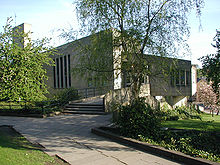The Architects' Co-Partnership (ACP) was a firm of English architects, founded in 1939 as the Architects' Cooperative Partnership by recent graduates of the Architectural Association School of Architecture.[1][2][3] It encouraged teamwork, and set out to be a practice in which all members would be equal.[1][2]

The firm filed for insolvency in 2014, and finally dissolved in 2018.[4]
Notable buildings
editIts notable buildings include:
- Brynmawr rubber factory (Michael Powers, 1946–52, with Ove Arup), the first post-war building to receive listed status[1][5]
- Danegrove Primary School (1949–50)[6]
- Dunelm House, Durham (Richard Raines and Michael Powers, 1966)[7]
- "Beehives", St John's College, Oxford (Michael Powers, 1958–60), the first modern student accommodation at the University of Oxford[8]
- St Paul's Cathedral School, London (Leo de Syllas and Michael Powers, 1962–7)[9]
- University of Essex, Colchester (Kenneth Capon, 1964)[10]
- Wolfson Building, Trinity College, Cambridge (1968–72)[11]
- Levi Strauss & Co. UK HQ and distribution centre, Northampton (1999)[12]
References
edit- ^ a b c "Architects' Co-Partnership". A Dictionary of Architecture and Landscape Architecture. Oxford University Press.
- ^ a b Powers, Alan (5 Feb 2009). "Obituary: Michael Grice". The Guardian.
- ^ Ward, Colin; Goodway, David (2003). Talking Anarchy. PM Press. p. 11. ISBN 9781604869057.
- ^ "Architects' Co-Partnership 1939 - 2018". Biographical Dictionary of British and Irish Architects 1800-1950.
- ^ Cadw. "Former Boiler House at Dunlop Semtex Factory (Grade II*) (1869)". National Historic Assets of Wales. Retrieved 23 March 2023.
- ^ Historic England. "Danegrove School (Grade II) (1064765)". National Heritage List for England. Retrieved 23 March 2023.
- ^ Historic England. "Dunelm House including landing stage, steps and attached walls (Grade II) (1477064)". National Heritage List for England. Retrieved 23 March 2023.
- ^ Historic England. "St John's College, The Beehives (Grade II) (1278860)". National Heritage List for England.
- ^ Historic England. "St Paul's Cathedral Choir School (Grade II*) (1391842)". National Heritage List for England.
- ^ Kucharek, Jan-Carlos. "University of Essex". RIBA Journal Magazine. Royal Institute of British Architects. Retrieved 23 March 2023.
- ^ Colin, Westwood (1972). "Wolfson Building, Trinity College, Cambridge: the south elevation". RIBAPix. Royal Institute of British Architects.
- ^ "Jean technology". Architects' Journal. 29 July 1999.